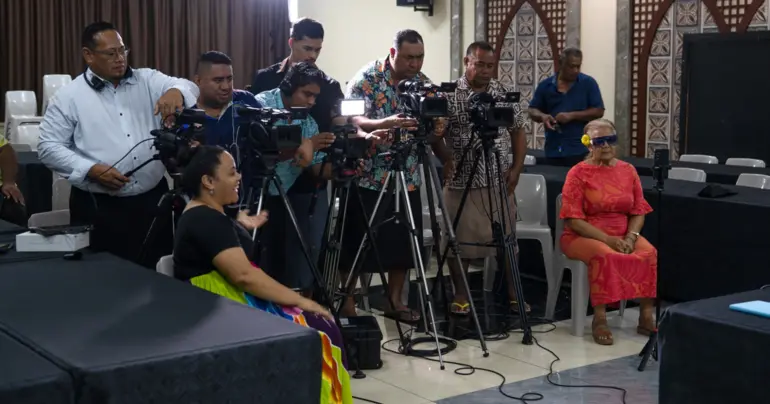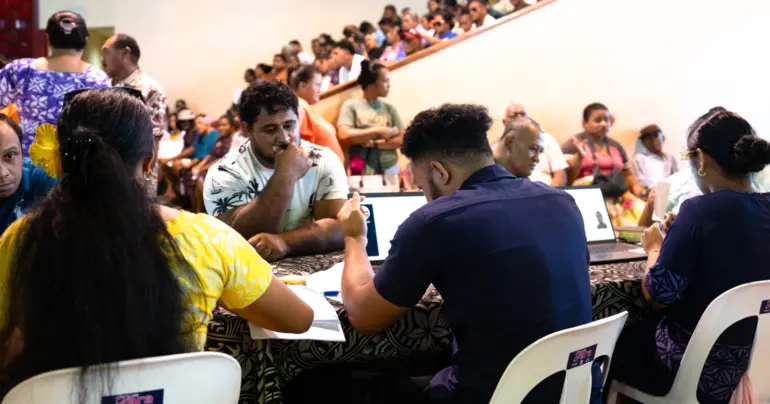WiFi debate politics at its worst
 By The Editorial Board
•
30 October 2020, 11:40PM
By The Editorial Board
•
30 October 2020, 11:40PM
In a political environment, such as ours, where insults of the worst kind are bandied about freely very few still have the power to command public attention. One such is corruption.
That allegation was seemingly made on the front page of the Thursday edition of the Thursday Samoa Observer about the most unlikely of cases - a school internet programme (“Liars, crooks,” P.M. counters “dirty politics” allegation).
Speaking about a project to deliver free internet access to schools in Savai’i, the Prime Minister, Tuilaepa Dr. Sa’ilele Malielegaoi responded in the strongest possible terms to criticisms made by the opposition party Fa’atuatua Samoa ua Tasi (F.A.S.T.).
The Prime Minister used the Samoan word “pi’opi’o” which could be interpreted as “corrupt” in his response to allegations made by F.A.S.T. about the long running about the legality of the project to rollout internet connections to schools that did not have them.
“If there is any dirty politics in here, it is them who are playing dirty politics,” Tuilaepa said.
“I hope their constituencies will look at these people they are bringing in because they are such prolific liars.”
What prompted such strong words from the Prime Minister?
At issue is an argument over a plan to roll out free WiFi internet connectivity to schools across Savai’i.
Last month the non-Government initiative was up and running at ten primary schools on the big island who were accessing the internet for the first time.
The satellite project is being rolled out by Netvo Samoa and Kacific Broadband Satellite Company.
But politics is also deeply embedded in the project. The rollout is connected to Samoa's newest opposition political party: Fa'atuatua i le Atua Samoa ua Tasi (F.A.S.T.).
There were plans to expand the project to another 40 schools before the project was stopped by the Government which claims the project had been unauthorised.
In fairness to the Prime Minister he was responding to rather heated criticism from F.A.S.T.’s founder, La’auli Leuatea Polataivao, who had criticised the WiFi shutdown:
“Dirty politics is the issue here”, La’auli told the media at a press conference.
“Our major concern is if dirty politics impacts a useful project such as this one, then that is just not right”.
The Government has gone so far to say that by rolling out free WiFi to schools, the companies and F.A.S.T. have acted “illegally” by not seeking regulatory approval first.
Togisala Tony Leota, the Chairman of F.A.S.T. by contrast claimed that the consortium behind the project have followed "the proper channels” and approached the Government before the project’s launch.
These details fade into insignificance when we zoom out and examine the issues that have led to such vitriolic exchanges from the leaders of our two largest political parties.
The internet is an indispensable educational tool.
For a country in receipt of USD$170 million in aid in 2018 alone and which has $1.01 billion in outstanding loans on the books, that no money has been found to connect rural primary schools to the greatest repository of knowledge in human history should be a national scandal.
And by involving itself in the project F.A.S.T. is trying to send precisely that message to voters: that the Government has neglected to invest in infrastructure or education adequately. The project has had the effect of embarrassing the Government.
It is ultimately disappointing that children’s education is being used as a political plaything.
If the initiative, regardless of who is behind it, achieves its goals of connecting 50 schools in the least economically developed part of Samoa to the internet it will achieve an unequivocally good thing for Samoa.
The Prime Minister’s recently ginned up criticism of the project - that internet access might expose children to lewd images - is a transparent attempt to muddy the political waters on a simple issue.
“We don’t want our children to see any bad pictures pop up through this,” the Prime Minister said.
Tuilaepa claimed that “only leaders who don’t have children, or leaders who have children but do not care about protecting them from being exposed to these bad pictures” would not understand the Government’s concerns.
Installing a filter that screens out any imagery or content that comes close to being classed as offensive is now standard practice for installing new computer networks and can be easily achieved.
Opposing the chance for schoolchildren to access what is ultimately the greatest library in the world on these grounds is simply wrongheaded.
We do not have enough information to judge whether or not this project was pushed through the appropriate channels as the Prime Minister alleges.
That matter, it seems, will now be decided in court, with F.A.S.T. mounting a challenge to the Government’s decision to stop the project and to prove its claim that the party and the organisations installing the satellite connections had sought official approval.
Regardless of what transpires in court, what we have seen this week is an unfortunate display of politics at its worst.
The leaders of the nation’s two largest political parties have locked horns over an issue and the result has been a debate of the most unedifying kind.
All the while, the central issue of improving children’s education and access to knowledge has been relegated to a secondary concern.
There are in fact no words to adequately describe just how muddled these priorities are.
 By The Editorial Board
•
30 October 2020, 11:40PM
By The Editorial Board
•
30 October 2020, 11:40PM










